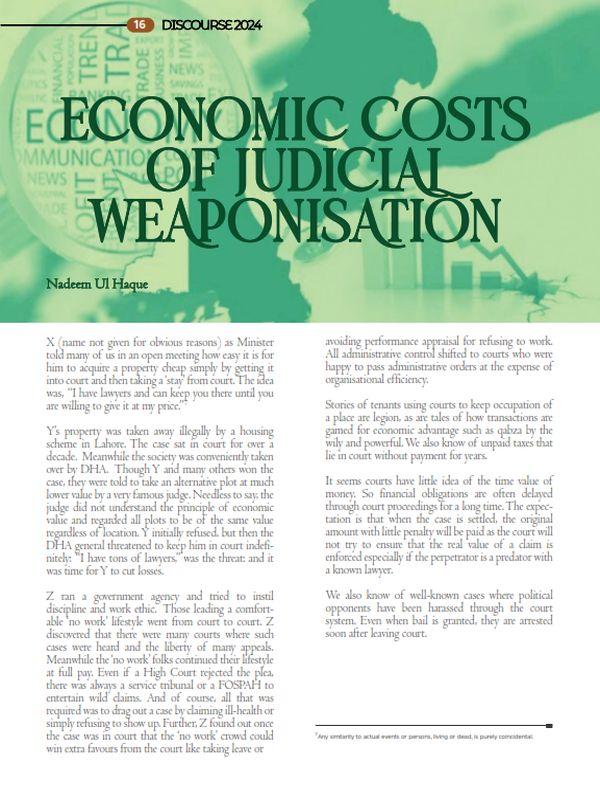Economic Costs of Judicial Weaponisation
X (name not given for obvious reasons) as Minister told many of us in an open meeting how easy it is for him to acquire a property cheap simply by getting it into court and then taking a ‘stay’ from court. The idea was, “I have lawyers and can keep you there until you are willing to give it at my price.”[1]
Y’s property was taken away illegally by a housing scheme in Lahore. The case sat in court for over a decade. Meanwhile the society was conveniently taken over by DHA. Though Y and many others won the case, they were told to take an alternative plot at much lower value by a very famous judge. Needless to say, the judge did not understand the principle of economic value and regarded all plots to be of the same value regardless of location. Y initially refused, but then the DHA general threatened to keep him in court indefinitely: “I have tons of lawyers,” was the threat: and it was time for Y to cut losses.
Z ran a government agency and tried to instil discipline and work ethic. Those leading a comfortable ‘no work’ lifestyle went from court to court. Z discovered that there were many courts where such cases were heard and the liberty of many appeals. Meanwhile the ‘no work’ folks continued their lifestyle at full pay. Even if a High Court rejected the plea, there was always a service tribunal or a FOSPAH to entertain wild claims. And of course, all that was required was to drag out a case by claiming ill-health or simply refusing to show up. Further, Z found out once the case was in court that the ‘no work’ crowd could win extra favours from the court like taking leave or avoiding performance appraisal or refusing to work. All administrative control shifted to courts who were happy to pass administrative orders at the expense of organisational efficiency.
Stories of tenants using courts to keep occupation of a place are legion, as are tales of how transactions are gamed for economic advantage such as qabza by the wily and powerful. We also know of unpaid taxes that lie in court without payment for years.
It seems courts have little idea of the time value of money. So financial obligations are often delayed through court proceedings for a long time. The expectation is that when the case is settled, the original amount with little penalty will be paid as the court will not try to ensure that the real value of a claim is enforced especially if the perpetrator is a predator with a known lawyer.
We also know of well-known cases where political opponents have been harassed through the court system. Even when bail is granted, they are arrested soon after leaving court.
In short, courts have been weaponised in Pakistan, which refers to the misuse or manipulation of legal processes and institutions for political or personal gain. This phenomenon can have serious implications for the rule of law, judicial independence, and public trust in the legal system.
Courts do not penalise such obviously strategic litigation making it very easy to use them for predatory economic gains. They also don’t seem to do any strategic thinking on the state of justice in Pakistan. Perhaps being involved in transactional justice and day to day operations and many ceremonial duties, the lordships have little time to engage in strategic thinking. Lordships must huddle over how to stop strategic use as well as the weaponisation of courts that impede speedy and secure transactions.
There is a clear need to understand that GDP increases every time a transaction happens. An oft-used example of this is that when someone’s leg breaks, GDP is increased by the sum of medical service provided.
GDP should be seen as the sum of all transactions. Courts need to recognise that delays (adjournments) and stays (injunctions), as well as lengthy and repeated appeal processes can be used to slow down transactions as well as game and devalue them. There are real economic consequences to these delays.
This is one reason for our low investment rate. Pakistan’s investment/GDP ratio is 14% whereas India is close to 30% and Bangladesh is over 25%. When a case gets stuck in court, it ties up capital which could otherwise be used to generate employment and growth.
A greater understanding of economics would improve our justice system. In fact, in the rest of the world law and economics – in terms of their interplay and overlap – is a serious subject. Despite the fact that a vast majority of our cases are economic in nature and languishing in courts, judicial training and legal education remain devoid of economics. Efforts at redressing this are often rebuffed by powerful legal lobbies.
Sadly, the economy always suffers!
The author is currently the Vice Chancellor of the Pakistan Institute of Development Economics (PIDE), Islamabad.
[1] Any similarity to actual events or persons, living or dead, is purely coincidental.




